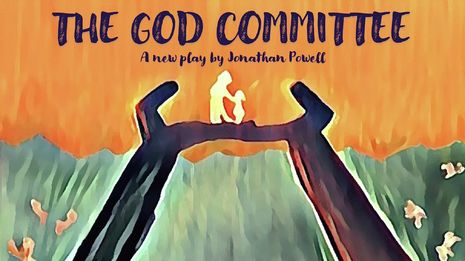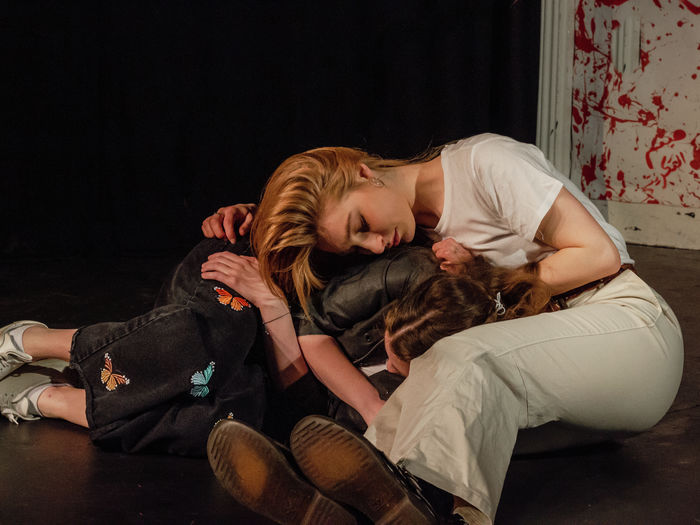Reimagining chilling history: Previewing The God Committee
Writer Jonathan Powell gives a sneak peek of his upcoming play taking the Downing stage later this week

From dogfights in the 40s to the halls of a hospital ward, this time-jumping story revolves around Oliver Critchlow (Colin Hood), a sarcastic and cantankerous old patient, and Emily Leeman (Harry Dixon-Spain), a teenage girl slowly dying from renal failure. Together the unlikely pair bond as they are shunted from ward to ward, tended by the mysterious Nurse Nightingale (Chloe Stark) and scrutinised from afar by the eponymous and anonymous ‘God Committee’.
“The script is so structurally and thematically layered,” says The God Committee’s wonderful director, Yelena Persaud. “It means that there’s lots of room for us to play with the surreal, non-naturalistic elements while remaining grounded in the core, emotive story at the show’s heart.”
“This group deliberated for years over who would live and who would die”
The show takes its title from a chilling true story. In 1961 a Doctor Belding Scribner of the University of Washington revolutionised the treatment of renal failure with an invention: the Teflon shunt. Implanted in a patient’s arm, Scribner’s shunt provided permanent access to their poisoned veins, radically expanding the number of people who could benefit from haemodialysis at any one time. This life-saving invention left one important question unanswered, however: who, of the thousands of applicants, would be chosen for treatment?
To protect doctors like Scribner from having to make the compromising decisions about their own patients’ fates, the job of selection fell to a committee of seven ordinary citizens. A banker, a priest, a lawyer, a state official, a labour leader, a surgeon, and a housewife – hardly a representative jury by today’s standards. Ruthless, secretive, and without guidelines or support, this group deliberated for years over who would live and who would die, based solely on the social worth written into the conveyor belt of nameless files that came before them. Bound by a series of their own straightjacketing rules – including a refusal to treat anyone under 18 – this death panel soon became known as ‘The God Committee’.
I would never claim to be a scientist, a doctor, or anything close to qualified to step into Scribner’s shoes, but using the one available transcript of the committee’s minutes as a springboard, the play goes beyond the historical to tell a universal and human story about making impossible decisions, and the guilt that plagues the ordinary people who unwittingly make the wrong ones.
“Talking to the cast about their characters is such a joy,” says Persaud. “I was fond of them as soon as I read the script, recognising figures from my teenage work experience at the local underfunded hospital and care home, but seeing them brought to life by a cast so keen to ask probing questions and give them their best has made me even fonder.”
“The dialogue ebbs and flows, swells, and crashes”
Indeed, the play is primarily about people, about how Oliver’s meandering journey affects others, and how life doesn’t always make narrative sense. Sometimes there isn’t anyone to blame for tragedy; sometimes people are just doing the best they can. Yes, the God Committee made some callous, abhorrent choices, and favoured the successful over the needy. But if not them, the task would have fallen to someone else. Though anonymous, they were still people.
In 2019 I was deeply affected when watching my dying Nanna being moved relentlessly around Leeds hospital, each overwhelmed new wing unfamiliar with her case and effectively resetting her treatment. At one point, even though she’d come from a palliative care ward and had innumerable ailments, they still tried to make her stand. It wasn’t any one person’s fault, but it happened, and there’s a lot of that experience in the play. Oliver wonders what goes through a person’s mind when they can hear you, but you can’t hear them, as if they’re submerged and far away.
To exemplify this, Persaud draws attention to the motif of water throughout the play: “The whole script feels like water to me: scenes shift and slip through your fingers; the dialogue ebbs and flows, swells, and crashes; it’s all so neatly moulded into under 90 minutes, but you get the sense that it is overflowing and uncontainable. Really, it’s very challenging, but a rather wonderful script to direct.”
Playing this Friday 4th March to Sunday 6th at Downing’s Howard Theatre, The God Committee promises to be an emotional exploration of the way our age of red tape and ruthless budget cuts leave no winners on any rung of the collapsing medical ladder, and what that means for those left struggling to cling on. Book your tickets here.
 News / Cambridge academics stand out in King’s 2026 Honours List2 January 2026
News / Cambridge academics stand out in King’s 2026 Honours List2 January 2026 Interviews / You don’t need to peak at Cambridge, says Robin Harding31 December 2025
Interviews / You don’t need to peak at Cambridge, says Robin Harding31 December 2025 Comment / What happened to men at Cambridge?31 December 2025
Comment / What happened to men at Cambridge?31 December 2025 Features / “It’s a momentary expression of rage”: reforming democracy from Cambridge4 January 2026
Features / “It’s a momentary expression of rage”: reforming democracy from Cambridge4 January 2026 News / Varsity’s biggest stories of 202531 December 2025
News / Varsity’s biggest stories of 202531 December 2025










